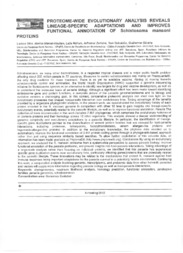Proteome-wide evolutionary analysis reveals lineage-specific adaptations and improves functional annotation of Schistosoma mansoni proteins.
Proteome-wide evolutionary analysis reveals lineage-specific adaptations and improves functional annotation of Schistosoma mansoni proteins.
Author(s): SILVA, L.; MARCET-HOUBEN, M.; NAHUM, L.; ZERLOTINI, A.; GALBADÓN, T.; OLIVEIRA, G.
Summary: In this context, comparative proteomic analysis can shed new light on the evolutionary processes that shaped hostparasite interaction over evolutionary time. Taking advantage of the benefits provided by a largescale phylogenetic analysis, in the present work, we reconstructed the evolutionary history of each protein encoded in the S. mansoni genome in comparison with other 12 taxa to gain insights into lineage-specific evolutionary events, potentially related to the parasitic lifestyle, as well as to improve functional annotation. Results The collection of trees reconstructed in this work includes 7,964 phylogenies, which comprises the evolutionary histories of all parasite proteins and their homologs across 12 other organisms. This analysis allowed a deeper understanding of genomic complexity and evolutionary adaptations to a parasitic lifestyle.
Publication year: 2012
Types of publication: Abstract in annals or event proceedings
Keywords: Genoma, Genomics, Proteoma, Proteome, Schistosoma Mansoni
Observation
Some of Embrapa's publications are published as ePub files. To read them, use or download one of the following free software options to your computer or mobile device. Android: Google Play Books; IOS: iBooks; Windows and Linux: Calibre.
Access other publications
Access the Agricultural Research Database (BDPA) to consult Embrapa's full library collection and records.
Visit Embrapa Bookstore to purchase books and other publications sold by Embrapa.

